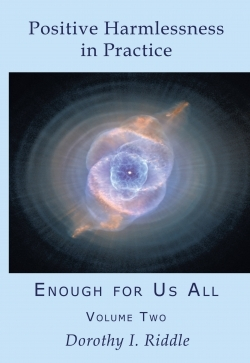Positive Harmlessness in Practice
Enough for Us All, Volume 2
The three volumes in Dr. Dorothy I. Riddle’s series, Enough for Us All, are designed to awaken awareness to the joy and abundance that are the birthright of all cosmic citizens. The first volume, Principles of Abundance for the Cosmic Citizen, brought science and metaphysics together in an engaging discussion of our interconnectedness in a vast cosmos that evolves through a process of symbiosis and cooperation, and how our ability to thrive as a species and as individuals depends upon moving beyond competitive self-interest to collaboration with others in a dance of give-and-take that assures that there will be enough for all to live and prosper.
Recognizing the need to develop attitudes that foster this cooperation and defuse the violence that threatens us all, Riddle offers her second volume, Positive Harmlessness in Practice, a thoughtful, wise, and mind-opening exploration of ways to help make harmlessness experiential in a culture in which habits of harm are so pervasive that they are felt to be “normal.”
Riddle traces the ubiquitous habits of harm to their root causes—fear of loss and scarcity, a belief in entitlement, ignorance of alternatives to violence, and an “us-them” mentality that objectifies other individuals or groups. Her call to eliminate violence against women —easily the most pervasive form of violence worldwide—exposes the ways in which men use violence as a way to prove their potency. Besides addressing this egregious harm with her characteristic passion and clarity, she also provides a unique Harmlessness Scale™ that gives readers the vocabulary and understanding necessary to recognize attitudes and characteristics that range from brutality to advocacy, making it possible to evaluate one’s own standing with regard to habits of harm and the hidden attitudes that may give rise to them.
Riddle courageously confronts centuries of worldwide religious belief and practice in pointing out that the “ethics of reciprocity” (the “Golden Rule” that is espoused by most world religions) is mostly motivated by self-interest, and stresses the urgent need to move beyond it to a “positive harmlessness” motivated by kindness and goodwill. While she makes it clear that “harmlessness is not simply a more extreme version of reciprocity, (but) a qualitatively different dynamic,” she is aware that it is difficult, if not impossible, to implement a way of being that one has not experienced.
To facilitate the embedding of a new ethic of harmlessness, Riddle offers the “Butterfly Shift mini-immersion”—an active, experiential harmlessness practice named for the chaos theory dynamic that accounts for the ripple effect that spreads out from a small and seemingly insignificant action. This simple daily practice disrupts familiar but harmful patterns, inspires feelings of hopefulness, and has a high probability of creating lasting behavioral change as it touches first one, then many, with kindness and compassion.
Riddle is a psychologist and economic development specialist who has worked in more than seventy-five developing countries, seeking to build understanding between different cultural, socioeconomic, and faith communities so that all may experience justice and equity.
Reviewed by
Kristine Morris
Disclosure: This article is not an endorsement, but a review. The publisher of this book provided free copies of the book and paid a small fee to have their book reviewed by a professional reviewer. Foreword Reviews and Clarion Reviews make no guarantee that the publisher will receive a positive review. Foreword Magazine, Inc. is disclosing this in accordance with the Federal Trade Commission’s 16 CFR, Part 255.

